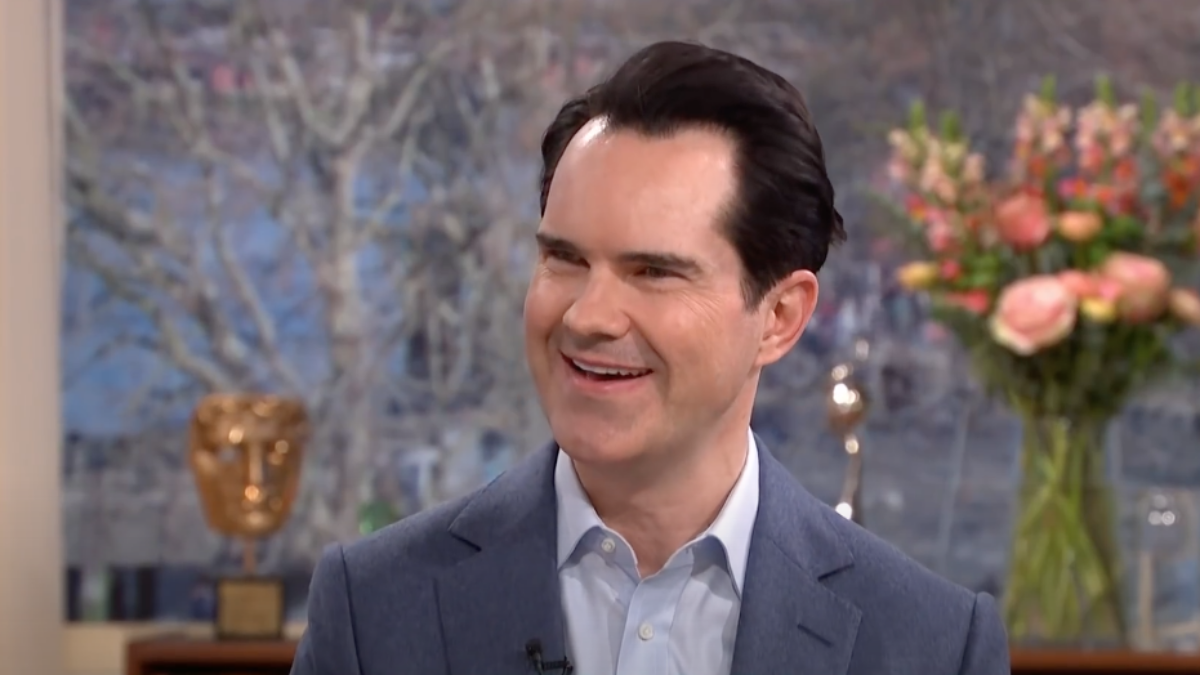As Spotify mulls the fate of Joe Rogan, Netflix is facing pressure over British comedian Jimmy Carr’s latest stand-up special. If the 2020s feel like “Russian Doll,” it’s because we’re indeed reliving the same hopeless cycle day after day, trapped in a perpetual battle to protect people from corporate censorship. It’s dull and maddening all at the same time.
The problem is deeper than any individual, whether they’re too-big-to-cancel or someone less powerful. Our secular leadership class finds its purpose and salvation in earthly virtue signals, mining satisfaction from superficial politics, chasing dopamine boosts as they wage cultural warfare on addictive social media platforms. These endless daily battles are an unmistakable symptom of decadence, meaning the hole out of which we must dig is deeper than politics.
In his December special, Carr told a joke that goes like this: “When people talk about the Holocaust, they talk about the tragedy and horror of 6 million Jewish lives being lost to the Nazi war machine. But they never mention the thousands of Gypsies that were killed by the Nazis. No one ever wants to talk about that, because no one ever wants to talk about the positives.”
The punchline is misdirection, shock value, and the depravity of Carr’s on-stage persona. It would be a controversial joke even in normal times, but that’s where good comedians thrive as a necessary part of our ecosystem, making people laugh with satirical immorality to keep our boundaries open for free expression.
People are supposed to get mad. They’re supposed to demand censorship and carry on like Tipper Gore. The problem these days is their success rate.
Already, the U.K. prime minister’s office condemned Carr and pledged to ensure “streaming services are more accountable.” Culture Secretary Nadine Dorries followed up with a call for legislation targeted at speech hosted by platforms like Netflix. Here in the United States, the White House press secretary said last week “every platform” should be “doing more to be calling out mis- and dis-information” and “there is more that can be done” to address information shared by entertainers like Rogan.
Carr began the special by warning, “Tonight’s show contains jokes about terrible things. “These are just jokes, not the terrible things,” he added. Before the bit in question, Carr joked it would be a “career ender.” His prediction wasn’t a difficult one.
Carr acknowledged the uproar during a show over the weekend, saying, “I am going to get canceled, that’s the bad news. The good news is I am going down swinging.”
That really is good news, because free markets are the last best hope at this point. Of course, Big Tech platforms enjoy monopolies in many cases, cushioning them from the blowback of consumer demand. But Netflix and Spotify aren’t among them, and the lure of big money is still powerful—at least to a point.
Most voters don’t want the Biden administration to get involved in the debate over Rogan by applying pressure to Spotify. So why would Jen Psaki weigh in like she did?
Most Netflix users don’t care if the platform hosts some controversial stand-up, nor do Spotify users care if the platform hosts some controversial podcasts. So what explains Netflix’s ham-fisted response to the controversy or David Chappelle and Spotify’s decision to scrub dozens of episodes of Rogan’s show?
The ranks of our leadership class are filled with two kinds of people: true believers and capitalists cowed by them. The true believers terrify Boomer politicians and executives into meeting their anti-speech demands, and those politicians and executives are often successfully intimated or convinced that doing nothing would spark a public relations backlash, risking their power and profits.
But those demands are out-of-step with most of the public. It’s true our economy is splintering into niches, but platforms with mass appeal like Spotify and Netflix still cater to a base of customers that largely doesn’t crave censorship. Furthermore, the market is still (kind of) allowing platforms like Rumble, which publicly made Rogan a huge offer on Monday, the opportunity to compete.
The Daily Wire is making good movies Hollywood won’t touch. Heterodox thinkers and journalists are thriving on Substack. Podcasts like “Red Scare” succeed massively on Patreon. Tucker Carlson is enormously popular. Rogan, Carr, and Chappelle can still draw huge crowds.
None of this is because Western consumers are broadly bigoted, it’s because they’re labeled bigots by false definitions forced on the country at the behest of a small but growing group of true believers in newsrooms and board rooms. The complaints to Substack and web servers and advertising platforms show that none of this is going to stop unless the public speaks through the market and the market responds. If Rogan goes to Rumble, their servers and banks will face protests.
The sooner executives like Ted Sarandos and Daniel Ek determine the threat of a P.R. backlash is just hype, that it’s okay to say their own employees are wrong, and that a lot of money can be made off controversial entertainers, the sooner we can override the vocal minority and restore some sanity to American culture.









